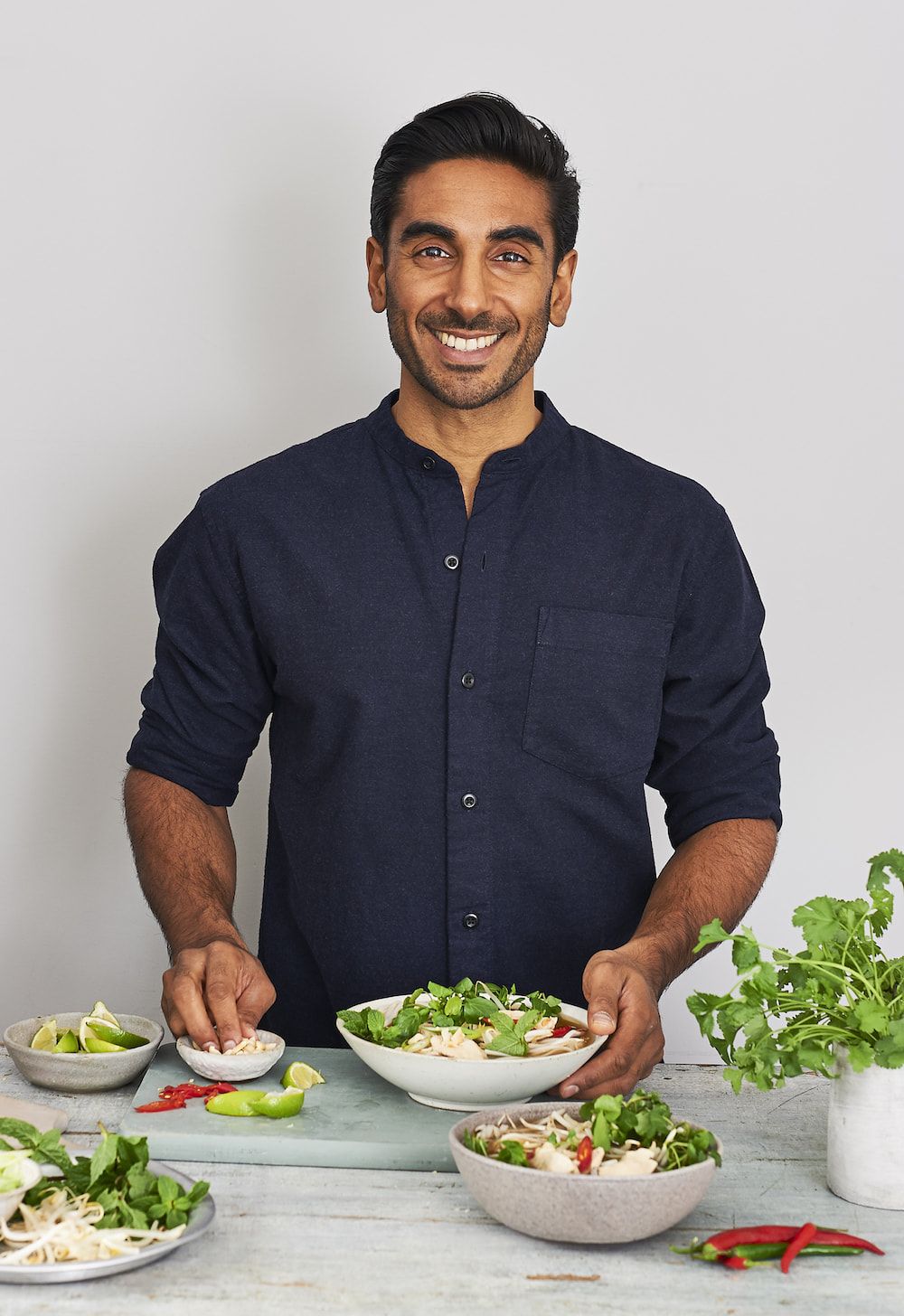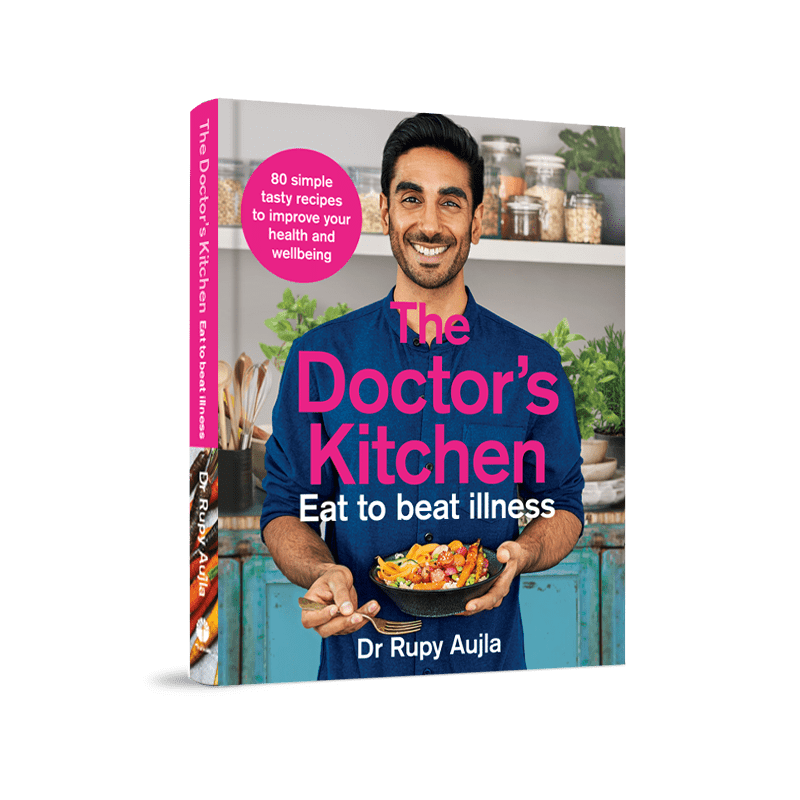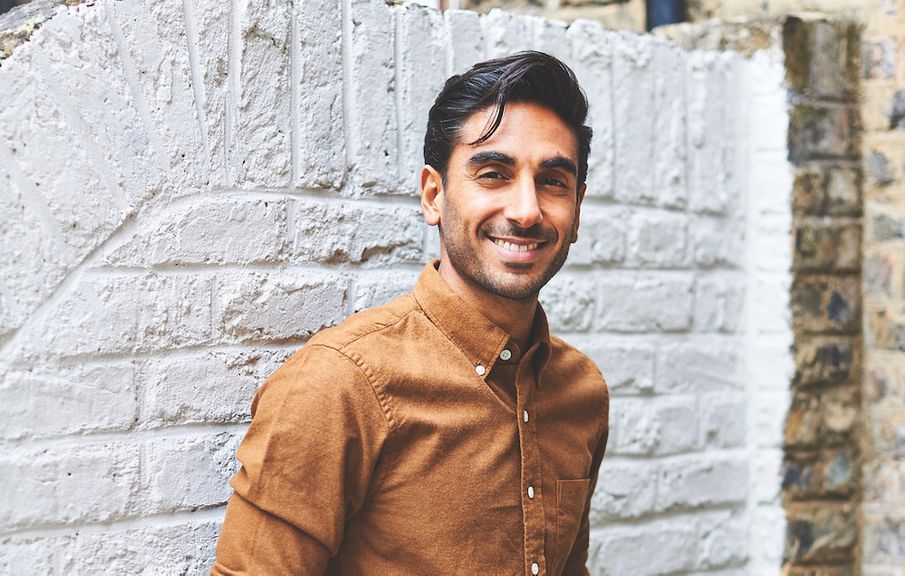With nearly 140,000 Instagram followers, a podcast, and two books under his belt, not to mention being a practising doctor, you won’t need us to tell you that Dr Rupy Aujla is somebody pretty special. Here we chat about the important role of nutrition in medicine, and how he’s cooking up a change...
They say an apple a day keeps the doctor away, but that may not be the case for the incredible Dr Rupy Aujla – if you’re cooking up a healthy dish, he’ll be the first one grabbing a plate and cheering you along!
While many people get into medicine by following in the footsteps of family members, for Rupy, it was all new – in fact, his family tried to convince him not to do it! His biggest inspiration was actually his mum’s experience, as she suffered from idiopathic anaphylaxis – a severe form of allergy. After being prescribed medication for life, she was able to overcome it with changes to her lifestyle.

Photography | Faith Mason
Rupy explains: “Watching her make these changes as a child was my inspiration. I realised that I liked the field of helping people. I liked the concept of changing lives through an overhaul of diet and lifestyle.”
And he’s got some big plans to do just that.
“I want this book to be the doctor in everyone’s kitchen,” Rupy says, elated but humble, as we discuss his new book, Eating to Beat Illness, hitting the shelves. With his sensational first cookbook, The Doctor’s Kitchen, a must-read for so many health and food conscious people out there, we can’t wait to have an intimate chat with our favourite doctor on healthy living, and his prescription for a more balanced life.
Hi Rupy! How did the idea for The Doctor’s Kitchen first come about?
About eight years ago I fell ill. I was suffering from atrial fibrillation (an irregular and often abnormally fast heartbeat) and after many tests, I was told to have an ablation procedure. It was this that sparked a change in my own lifestyle.
The power of food and healthy living isn’t taught in medical school, and it took my own experience to realise just how much of an impact nutrition can have.
The driving force behind The Doctor’s Kitchen was the idea of creating motivating, exciting, and accessible recipes that encourage people to recognise food as an important health intervention. Now, I’m trying to understand how we can equip the modern doctor to feel confident having conversations about food in a clinical environment.
Is that where your UK Culinary Medicine course comes in?
Culinary Medicine is a concept that started in the US. They graciously licensed me the course, and we have adapted it for UK practitioners.
In a nutshell, it teaches doctors the foundations of clinical nutrition and how to cook. If you can cook, you can better motivate your patients to look after their health using food as another clinical tool, not a replacement. The goal is to scale that to create a new generation of doctors that can appreciate the medicinal effects of eating well.
Your new book could help with that! Tell us more.
I never actually wanted to do a second book! The first one was so much stress, but the feedback was incredible.
Eat to Beat Illness was born out of me having more conversations with people about different specialties. Whether it’s your eyes, your immune system, or your brain, nutrition plays an important role for those areas. That’s what the book is about.

‘Eat to Beat Illness’ by Dr Rupy Aujla (Harper Thorsons, £16.99)
What can people learn from the recipes?
We give people a real understanding that healthy eating isn’t a particular style of food. It introduces the concept that by applying healthy principles, you can eat whatever cuisine, and lead a healthy, happy life.
I hope the recipes encourage people to be experimental with spices and herbs. From a health point of view, some of the best herbs are the ones that are accessible. Basil, rosemary, garlic, thyme. We need to start appreciating just how powerful these can be for health.
You’re a doctor, an author, a podcast host, and influencer. Is this what you expected when starting out as a med student?
Not at all. It started with one patient, where during our appointment I suggested making the change from breakfast cereal to oats. He asked me how. I realised, there are some people who just don’t cook. It was humbling for me to appreciate that not everyone had the advantage of having a mother who taught them how to cook from scratch.
This space is my way of influencing public health. I don’t imagine for one moment that the people who really need the information are following me on Instagram, but it does give me an opportunity to reach a large audience. I now have the chance to work with other influential people or industry experts, like NHS England or the Royal College of GPs.
What’s your advice for eating for stress?
Gratitude. Recognising when you’re stressed is most important. Understand that feeling, appreciate the stress and let it wash over you. Take yourself out of the situation. Taking this time, even for five minutes can be very useful. By practising gratitude, we can hopefully appreciate the wider picture a bit more.
How do you look after your own mental wellbeing?
I probably don’t practise what I preach in terms of taking time off. I’m lucky that I can do my clinical work when it suits me, so I can also do my masters, my nonprofit work, and everything else. But it does take a toll.
Gratitude has been revolutionary for me. It reminds me, even when I’m completely overwhelmed, that I should be appreciative of the environment around me, and that I’m lucky to be alive in that moment.
I’m pretty regimented when it comes to exercise. I work out in the morning and it’s an incredible start to my day. Without exercise to maintain my stress levels, my enthusiasm and motivation, I wouldn’t get as much done.
Follow Rupy on Instagram @doctors_kitchen, and visit his website thedoctorskitchen.com


Comments